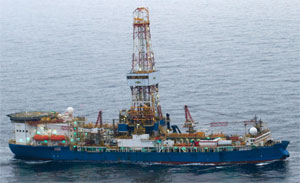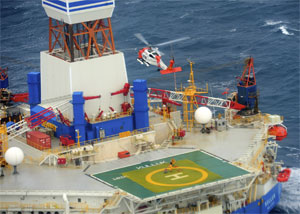Problems with two of its drilling vessels have led Royal Dutch Shell to delay offshore oil exploration in Alaska’s Arctic for 2013, while regulatory uncertainty has prompted rival ConocoPhillips to postpone its plans to drill there through 2014.
In February, Shell announced a “pause” in exploratory drilling in the Chukchi and Beaufort seas to “ensure the readiness” of equipment and personnel following the 2012 drilling season. Shell’s efforts in the Arctic last year were marked by setbacks, primarily with the drilling vessels Kulluk and Noble Discoverer.
In December, Kulluk ran aground off Sitkalidak Island south of Kodiak during a storm, resulting in damage to the rig’s hull and electronics. Noble Discoverer, which nearly grounded after dragging its anchor in July in Dutch Harbor, was cited by the U.S. Coast Guard in November for safety and environmental violations. Both vessels are now in Asian shipyards for repairs — Kulluk in Singapore and Noble Discoverer in South Korea.
 |
|
Photo courtesy U.S. Coast Guard |
|
Drill ship Noble Discoverer underway near Nome, Alaska, in August. |
In the wake of those incidents, the U.S. Department of the Interior issued a report faulting Shell’s oversight and calling for the industry and government to work together on an “Arctic-specific model” for offshore oil exploration. That led ConocoPhillips to postpone its plans to drill in the Chukchi Sea in 2014, citing uncertainties about the regulatory and permitting process.
“While we are confident in our own expertise and ability to safely conduct offshore Arctic operations, we believe that more time is needed to ensure that all regulatory stakeholders are aligned,” Trond-Erik Johansen, president of ConocoPhillips Alaska, said in a statement in April.
U.S. Rep. Ed Markey, D-Mass., the top Democrat on the House Natural Resources Committee, had been critical of Shell’s offshore activity in the Arctic and said the decision to delay drilling in 2013 was the correct one.
“After bumbling through a year of mishaps, beachings and complete safety failures, it’s clear that Shell and the oil industry were not ready to drill in the Arctic,” Markey said in a statement. “This postponement … should allow the Department of Interior the time it needs to do a full review of the oil industry’s capability to handle the harsh conditions (there).”
Kulluk, a Shell-owned conical drill unit with a diameter of 266 feet, had returned from drilling in the Beaufort Sea and was en route to Seattle for maintenance when it broke loose from tugboats and grounded on Dec. 31. Kulluk’s outer hull was damaged but its inner hull was not, according to the Coast Guard, which is still investigating the incident. Electronic equipment in the superstructure was damaged when seawater breached the vessel’s windows and hatches.
The 571-foot Noble Discoverer, contracted by Shell from Noble Corp., nearly went aground in 30-knot winds on July 14 in Dutch Harbor before heading north to drill in the Chukchi Sea. Despite reports from some witnesses that the vessel struck bottom after its anchor dragged, Coast Guard Petty Officer 1st Class David Mosley said that likely wasn’t the case.
“There’s no indication from what our investigators looked into that the vessel had gone aground, or if it had there was no damage,” Mosley said.
Noble Discoverer ran into more trouble in late November after it had to be towed into the port of Seward. Coast Guard inspectors there cited 16 safety and pollution control violations, including a lack of engine maintenance that resulted in the loss of main propulsion and an exhaust-system explosion; fire screen doors in accommodation spaces that would not self-close; and abnormal propeller shaft vibration that required the shutdown of the main engine at sea. Investigators determined that the “current propulsion arrangement does not result in sufficient speed at sea to safely maneuver in all expected conditions without tow assistance,” according to a Coast Guard document provided to the Natural Resources Committee.
Mosley said the Coast Guard has completed its investigation of Noble Discoverer and has turned over its findings to the U.S. Justice Department.
Repeated calls to Shell for comment on the incidents involving Kulluk and Noble Discoverer were not returned. On Shell’s website, the company says it is preparing equipment for a return to the Arctic and that oil exploration activity there will resume “at a later stage.”
ConocoPhillips’ plans for 2014 involved drilling one or two exploratory wells in the Devil’s Paw prospect in the Chukchi Sea, about 80 miles offshore and south of where Shell had been drilling. ConocoPhillips had contracted to use a jackup rig, Houston Colbert, which the company said was “optimal” for the shallow water at the site and would minimize downtime due to poor weather.
The rig, 231 feet long and 277 feet wide, is being built by Noble in Singapore. It is part of Noble’s new JU3000 line that includes upgrades from the JU2000s currently in service in the North Sea and the Middle East, said John Breed, a spokesman for Noble.
Natalie Lowman, spokeswoman for ConocoPhillips Alaska, said the company planned to terminate the rig contract with Noble following the decision to postpone offshore drilling in the Arctic. A time line for when ConocoPhillips would proceed was uncertain.
“We really have to work with what’s happening with the Department of the Interior before we make any further plans,” Lowman said. If the company does move ahead with drilling, “we believe that a properly designed jackup rig is the right solution for the Chukchi Sea.”

